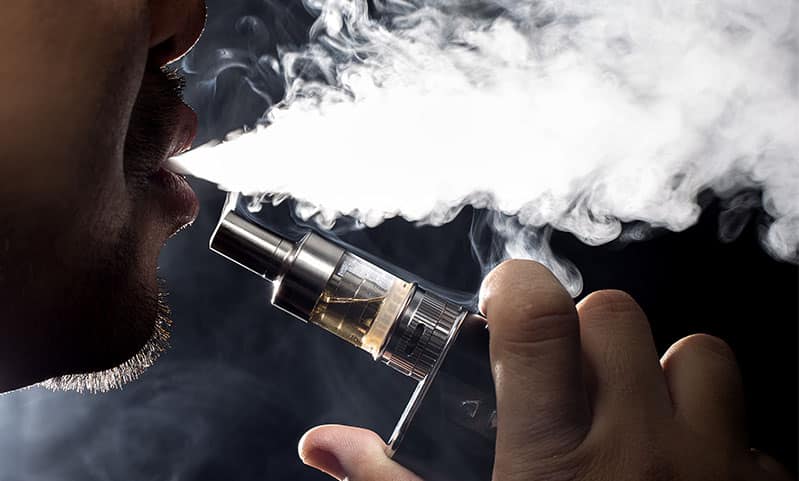Vitamin E acetate is one culprit named in the recent U.S. outbreak of vaping related lung injuries across 46 states and one US territory. The Center for Disease Control reports there have been 2,172 vaping related lung illness and injury cases and 43 vaping related deaths.
Vitamin E acetate is a chemical found in illicit THC oil for use in cannabis vape products. The chemical becomes deadly when it is inhaled as it sticks to lung tissue and causes severe burns.
In a new study, the toxicant was identified in every lung fluid sample from 29 patients that suffered vaping related injuries across 10 different states.
Since the sample selection was so broad, it is likely representative of the larger population and unlikely to have come from one supplier.
“These findings reinforce CDC’s recommendation that persons should not use e-cigarette or vaping products containing THC, especially those obtained from informal sources such as friends or family, or those from the illicit market, where product ingredients are unknown or can be highly variable,” the report stated.
Health officials in Illinois and Wisconsin warned vapers of illegal brands such as Dank Vapes, TKO, Off White, and Moon Rocks.
“Dank Vapes appears to be the most prominent in a class of largely counterfeit brands, with common packaging that is easily available online and that is used by distributors to market THC-containing cartridges with no obvious centralized production or distribution,” state health officials and the CDC reports.
Vaping products sold online by unknown manufacturers are just a deadly combination of unknown chemicals labeled as THC oil. These sketchy vape “companies” add vitamin E acetate to their products to make more of a profit as the chemical dilutes and thickens the THC.
Vitamin E acetate is safe and beneficial as a skin care product and vitamin supplement. It is used in face creams and serums as it is rich in antioxidants that fight aging and sun damage.
It is also found naturally in olive oil, nuts, some vegetables, and certain dairy products. It only becomes dangerous when it is inhaled as it causes severe injuries to the lungs that resemble chemical burns, burns that researchers compared to World War I mustard gas burns.
A survey in Illinois showed that out of 4,000 adults, patients with vaping related injuries were twice as likely to vape exclusively cannabis-based vapes and nine times as likely to have purchased THC vapes from informal or illegal sources than those who did not suffer from vaping related injuries.
Although this toxin has been identified, that doesn’t exclude other vaping products. Some vapers who became ill (and one who died) stated they only vaped nicotine products, and others reported buying THC vapes legally from a licensed state dispensary.
Although it is unclear whether pre-existing respiratory illnesses may have also been at play in some of these cases, The CDC is continuing to tell the public not to vape anything.
States and cities have enacted vaping bans, mostly banning flavored e-cigarettes, but some have even placed temporary bans on all vaping products.
The FDA and the Trump Administration plan to ban all flavored e-cigarettes except for menthol and tobacco, and to raise the age of purchase to 21 in order to discourage use in minors.
Juul Labs, maker of Juuls and the largest seller of e-cigarettes in the U.S., discontinued selling its flavored Juul pods earlier this month. They had faced criticism for targeting youths with their fruity flavors, although Juul denied marketing to minors.
Despite Juul’s efforts, teen vaping is still on the rise, and flavored pods and Juul pod copycats are available online.
Over five million minors vape, that’s more than 1 out of 4 high school students. Sixty percent of teens who vape reported vaping fruit, mint, and menthol flavors.
While some believe banning flavored Juul pods to be misguided and pointless, nicotine vape products contain more nicotine than cigarettes.
Their appeal to high schoolers increases the chances of teen addiction. In general, vaping is less harmful than smoking as cigarettes contain carcinogens, but both present health risks.
The majority of those who have suffered from vaping related injuries were males between the ages of 18 and 34, however anyone who vapes nicotine or THC products should look out for symptoms similar to pneumonia or the flu.
Severe cough, shortness of breath, trouble breathing, and fever were all common symptoms of those with vaping related illnesses who ended up in hospitals and even intensive care units.
Some ended up needing ventilators to assist in breathing. With this update on the cause of illnesses and deaths related to vaping one thing remains clear: if you or someone you know is buying dab pens from anywhere that isn’t a licensed state dispensary, stop.
